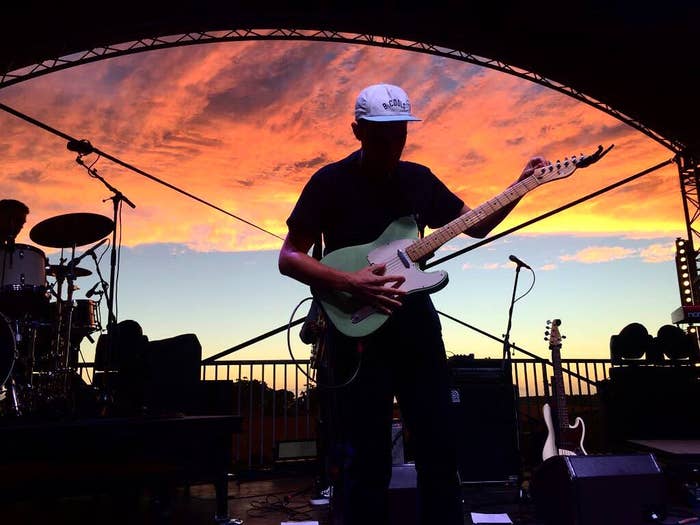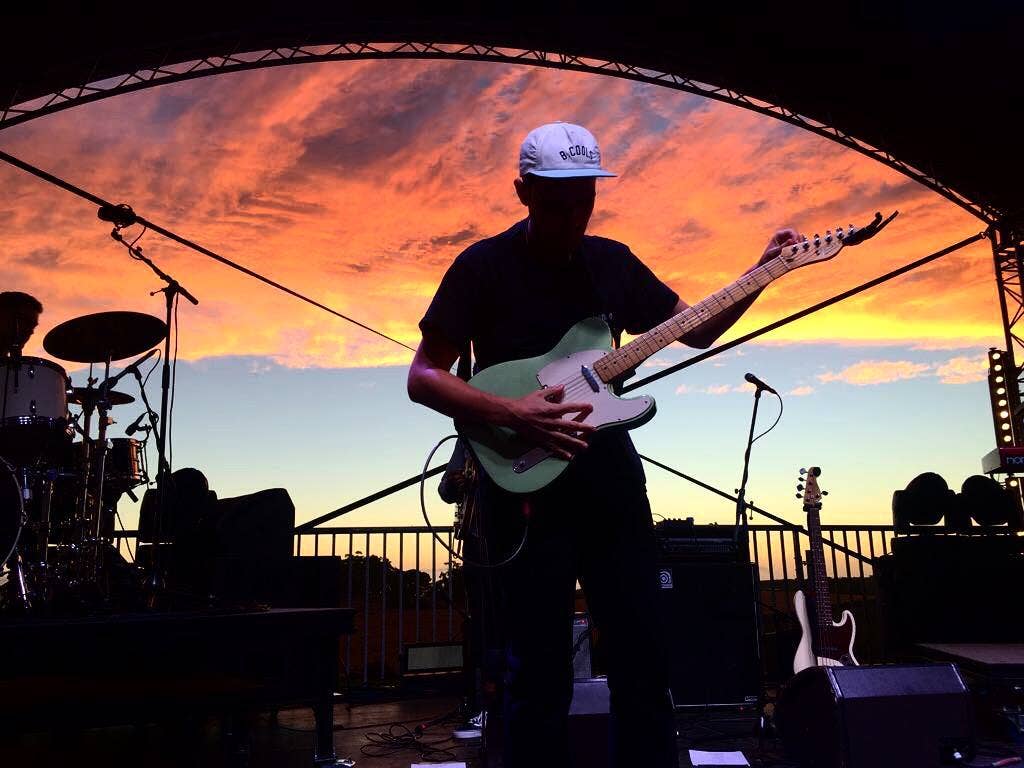
A singer, producer, and multi-instrumentalist, Jordan Rakei has been a pillar of South London’s jazz and neo-soul scenes ever since he touched down there from Australia in 2014. He has worked with such notable southerners as Loyle Carner and Bradley Zero, performed with Moses Boyd and Oscar Jerome, and even started up a podcast with Tom Misch (alongside pianist/producer Alfa Mist and rapper Barney Artist, who are both from Newham, but you get the drift). Rakei’s collaborative approach and supremely chill sound allowed him to be immediately ingratiated into a scene that was on the cusp of exploding when he arrived, and has since bloomed into a real staple of the UK’s musical landscape. In short, if you’ve been enjoying the work of any of the musicians listed above, you’ve almost certainly been enjoying Rakei’s work too.
However, being so deeply embedded within those scenes also means that Rakei is something of an enigma. As an artist that switches styles and instruments with ease, building a strong solo identity around his work has often proven a challenge for him, constantly finding himself being compared to peers and friends in the scene. He doesn’t mind, really—a Kiwi by birth, Rakei’s chillness extends beyond just his music—however with the release of his third album, Origin, that is all about to change. His second album for Ninja Tune, Origin is unlike any Jordan Rakei album there’s been before. On the first listen, it sounds like business as usual—the grooves are strong, the vocals soaring and the synths have enough shimmer to light up a glitter ball. But delve into the lyrics and a new world appears; it’s one where the sunny, Soulquarian-inspired aesthetic is nothing more than a veneer, thinly stretched over dystopian lyrics, dark prophecies and all manner of worrying tales.
Whereas his previous records have been introspective and mostly concerned with events in his own life, Jordan Rakei describes Origin as his Black Mirror album—a sideways look at technology and its potential to cause harm to human beings. Ironically, it’s his strongest statement of intent as a solo artist yet.
Hey, Jordan! How’s your day been so far?
Yeah, good man. I just took my dog to the vet to get a check-up but other than that, just chilling. We’ve only had her for like two weeks, so we’re just getting her vaccinations and getting her ready for life; she’s a golden retriever puppy. It’s been hard work on the album, and now it’s hard work on the puppy-raising.
I’m sure you’ll survive the puppy! Origin, your new album, is out right now, and it’s been two years since the last album Wallflower. What has happened between then and now?
When I finished Wallflower, I hadn’t written in about six months. I write really quickly and spend a lot of time editing and producing and doing that kind of stuff, so it’d been such a long time. Once it came out, I was starting to write this album. It happened really quickly, a couple of months. I just wanted to keep on making music. I feel like I’m in a good, creative space—music’s flowing pretty freely from me—so I don’t want to sit around for years on a single or something. I just want to get stuff out, and if I don’t like it in two years, that’s fine—I’ll make something else. It’s what I’ve captured in that moment. I always loved looking into the discographies of people like Prince and Joni Mitchell, and they have like 30 records. Some of them are bad, everybody knows that they have bad albums but everyone talks more about their work ethic and their body of work. I think that’s cool—I think that’s a lot cooler than what D’Angelo did, with three albums in twenty years.
Naturally, I think I gravitate towards darker lyrics, even though I’m quite a happy person.
You’ve been working on a lot of other people’s music recently too, right?
Yeah, I helped Loyle Carner make his new album—I made about five or six of those beats which was really fun, because it’s my roots; I used to be a hip-hop producer before I was a singer. That was amazing. I’ve been working with Tom Misch. I did some work on the Rosie Lowe record, she’s amazing. She messaged me about putting together this remote choir where we all recorded in our space, and I’m in there with some good company: Jamie Liddell, Jamie Woon, Kwabs—they’re all amazing so I feel lucky to be a part of it.
Back to Origin, what are some of the themes on the record? There seems to be a dystopian influence on it.
Sonically, I wanted the album to be fun and colourful—really vibrant and funky—but I wanted the lyrics to have this kind of dark connotation about this end of the world-esque scenario where technology has taken over in the vein of a tyrant/dictator. Each song is a different scenario about how technology can have its effect. I guess one could say I have a less than optimistic view of how it will be good for us. Naturally, I think I gravitate towards darker lyrics, even though I’m quite a happy person.
What was that process like? Was that a new experience?
It was new, definitely. I wanted to challenge myself because my last two albums were about my experience in the world and dealing with my own things, and this is much more outwardly projected predictions and views for the world. To find concepts for each song, I had to do a bit of research into all these new technologies that are being developed. There’s lots in there about virtual and augmented reality, a world where it’s very realistic, and you won’t be able to distinguish between what’s real and what’s fake. I read about Elon Musk creating this technology where you can merge your brain into the internet—he calls it a neuro-link—and I found that fascinating to imagine what that would like and the ethics of it. I got deep into robot ethics and simulation theory and stuff like that to come up with concepts for these songs.
Would you say it’s a neo-soul sci-fi album, then?
[Laughs] Yeah, it’s neo-sci-fi.
What was the scariest thing you discovered in your research?
There’s this big conversation about ‘the singularity’, the concept that we’re going to develop these incredibly intelligent computers and then those computers will develop a computer our intelligence couldn’t create and then that next computer will... basically, it blows up into this hyper-intelligent species, or whatever that is. That’s the world in which all of this is set in—a world where the exponential computer is constantly being born. It could work out humans are no longer needed. I thought that was quite scary.
Is that where the Origin title comes from?
Yes, exactly. It’s about embracing the beginnings of your own humanity, to remind yourself that as technology becomes easier to use, we should remember who and what we are. We feel emotions, we make mistakes, we connect with people on a personal level. It’s about regaining the origins of your humanity.
Was there a particular event, or did you read anything in particular that prompted this line of thought?
I listened to a podcast about the morals of AI, which made me think about how much of a slave to my phone I was at that point. I was quite aware of it, but if someone called me, I’d answer straight away, or if someone texted me, I’d jump on it. I felt quite controlled by the phone. It was that fear of ‘this is only a phone, imagine if the technology was stronger and harder to resist? What will humanity become if we lose those creative thinking and critical thinking skills because everything is just dictated by algorithms?’
You have a podcast, and you blew up through SoundCloud and the internet more widely. As someone whose creative output is tied into that same tech, is that a strange thing to reconcile?
It is—I thought about that recently—I wouldn’t be where I am today without the internet. Now, there’s a pressure I feel to be more of a personality, so there’s this pull of trying to stay away from the phone as much as possible but also trying to sell the product to as many people as possible. I’m trying to balance that. Do I post something personal to let people into my life more, even of it means a lack of security on the technology front? The temptation is still always there. This is all very primitive technology compared to the way it could go in the next twenty or thirty years, and as much as I’m wary of it, I’ll still post things to get likes so that I get higher in the algorithm and then people will download my album. It’s something I still struggle with, that’s why I worry about it.
Have your thoughts on it changed since you finished the album?
I think they have. When I was writing the album, I was a bit more distant from it—I didn’t have a lot of the apps on my phone. I’d go weeks or months between posts because I was so involved in the music but now I have this inner dialogue where I think, “I need to promote this—it’s been three days since I said anything about it.” I get annoyed about how much I rely on it to sell the music; I wish it didn’t control my day so much. This time last year, I was much less negatively affected by social media. Now I think of it as a tool I have to use to keep my fans happy. I love my fans—they come to the shows, we have a great time, we have great conversations—but to get them to the shows and to have those conversations, I have to use social media.
On the topic of fans and social media, did you know you have a Brazilian fan account now?
No, I didn’t! That’s sick! I haven’t played a show there, so maybe I need to get over.
Do you think there are still positives to technology?
I’m wary, as it’s inevitable that it will get more powerful, but if we can use it properly—it will be amazing. There will be a point where you can think something, and you’ll instantly have access to that information. That will be amazing; everyone will be able to make equal decisions, and everyone will have equal access to information. The positivity in it is that you’re a human and you can maintain control over it—that’s a powerful thing.
How do you see all of this in relation to music?
That’s something I battled making this album. I heard from a few people, not in my team, just in the industry, “Shouldn’t you just release eleven singles instead of an album?” or “You should make shorter versions to release as snippets on Instagram.” I think we are going to a world where there’s less and less attention span. There are these Instagram famous instrumentalists who sit at home and make loops, and they have hundreds of thousands of fans. That could be the future: where we idealise snippets of amazing musicianship instead of albums, which is worrying. It sounds like I’m having a go, but I’m just interested in how we’re losing that idea of what an album is and why it’s important.
I was really looking forward to the new Flying Lotus album—he’s one of my favourite artists and I’ve only listened to it two or three times since it came out, which made me think about all the hard work I’ve done and whether my biggest fans will only listen to my album once or twice. You can think of it even in terms of arrangements: if you have a three-minute sax solo in the middle of a record, you could lose people there. As a creative you never want to think of things like that, you just want to make the best song, but I think it’s the case now where you’re conscious of that. Sometimes you don’t want to be, but you have to be because I want people to hear the whole album, not just half of it. You have to keep that in mind.
There’s a lot of noise online, and it can feel difficult to cut through it—your music, in particular, is spoken about within the context of the South London neo-soul/jazz scene as well. Do you ever struggle to place yourself as an individual artist within that?
That’s something I struggle with all the time. My brothers told me that, from the outside, it seems like everyone in that scene—apart from me, Alfa Mist, Barney Artist and Tom Misch, because we all hang out a lot—makes the same kind of music. For me, when you can’t establish an individual identity as an artist, it can make you question the creative process because you’re like, “Okay, if my half my fans are London jazz fans, does it need to be jazzier?” or “If half my fans found me through the Loyle Carner collaborations, then should I make my own work sound more hip-hop produced?” It’s hard, but at the same time it’s really beneficial because working with all those people has boosted my work. I posted this on Twitter the other week and got a bit of hate for it: “Just because you like two artists doesn’t mean they should collaborate.” That’s a new thing that happens a lot. I could meet someone I love and post a pic, and then everyone will comment “collab, collab, collab”, but it doesn’t need to be that.
There’s such an emphasis on collaboration at the moment—do you think it minimises the individual musicians?
Yes, totally.
How do you view yourself within that world then?
I’m a bit of an odd one, I think. I’m a Kiwi-born person, but I grew up in Australia. In my early days in Australia’s music scene, I’d say I was a Kiwi and I think I didn’t fully represent myself as Australian so I wouldn’t get supported so much by the Australian music press. Then I moved to London, and I’m sort of put into the UK scene, but I’m also seen as an outsider because I’ve come from Australia and New Zealand. I think it works for me in two ways, because I’m associated with people like Yussef Dayes, Alfa Mist and Tom Misch, but I also get to be outside a little as well because some people still aren’t sure if I live in the UK or not.
You said on Twitter you’ve got three more years to make two more albums—do you stand by that?
Yep! I said that before I made my first album. I wanted to release five albums before I was 30. I was 24 then, and I’m 27 now. I’ve done three now, so two to go. It’s a goal I definitely want to hit. With this album, I even asked my label what would I need to go to get it out this summer and they gave me the January deadline before I even started writing.

